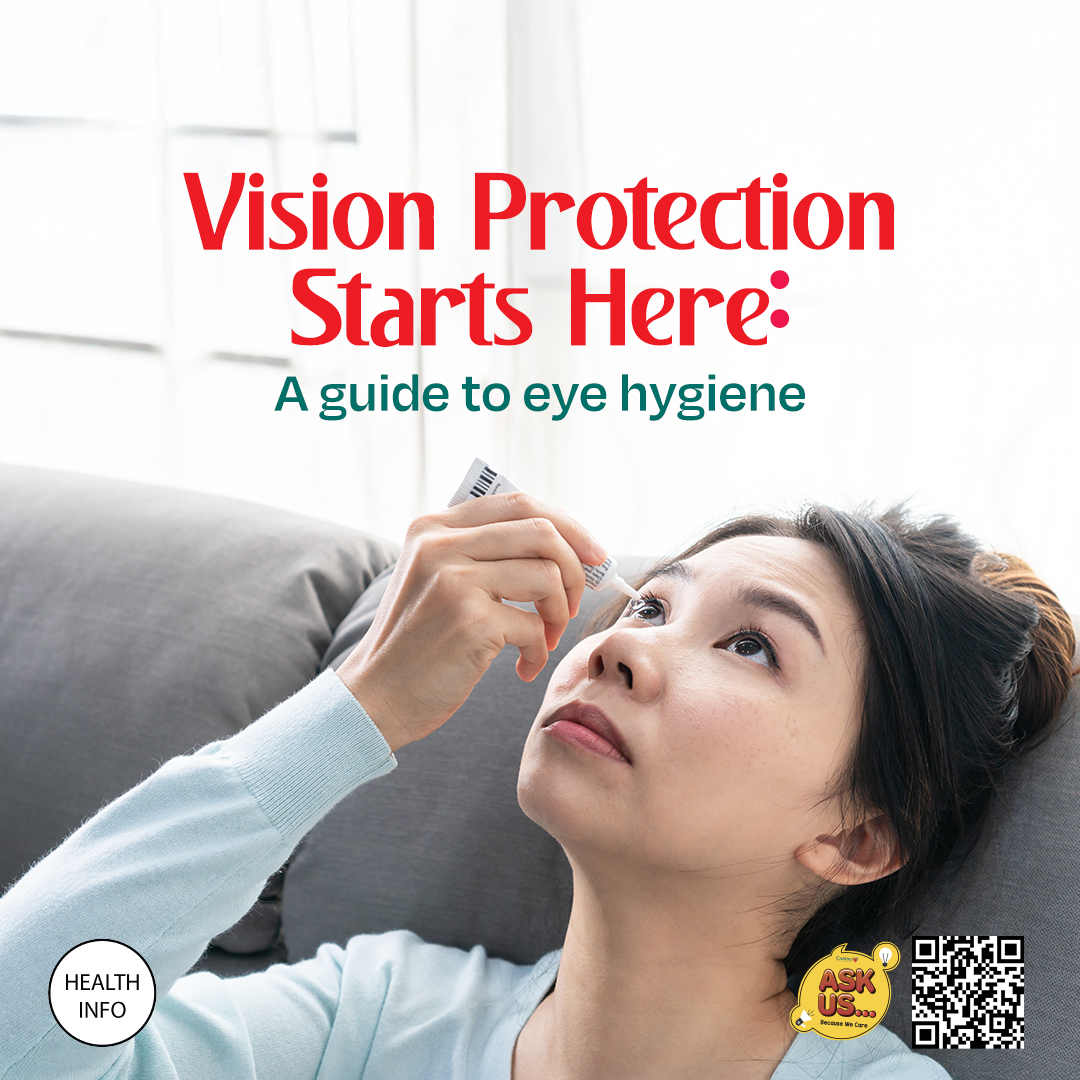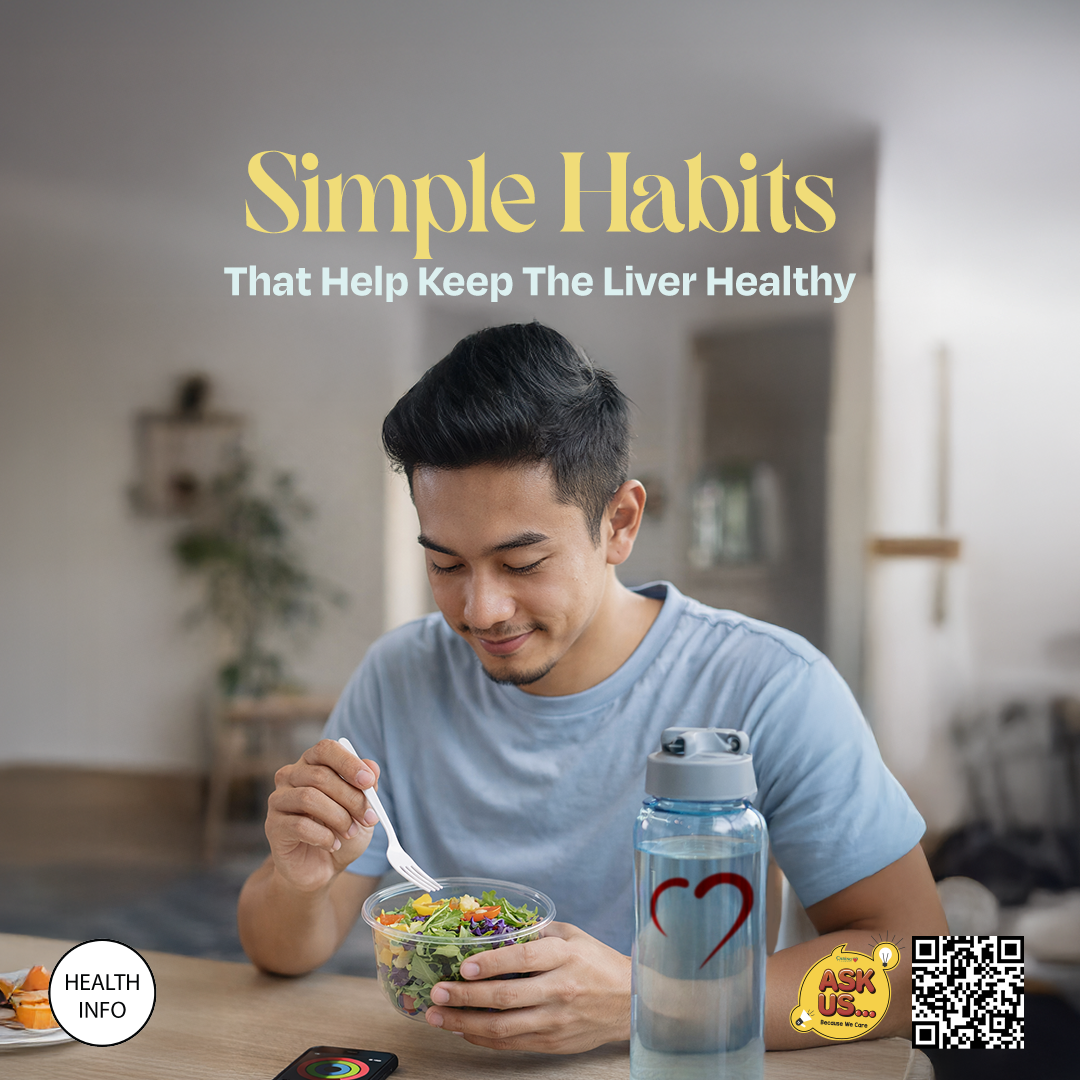- Home
- Health Center
- Health Info
- Vision Protection Starts Here: A Guide to Eye Hygiene
Eye
Vision Protection Starts Here: A Guide to Eye Hygiene


Our eyes are vital sensory organs, playing a crucial role in our daily lives. Yet, we often take them for granted, only paying attention when discomfort, irritation or vision problems arise. Incorporating good eye hygiene into daily routine can help preserve our vision and prevent common eye issues. Here are some simple ways to maintain good eye hygiene:
- Clean your hands before touching your eyes: Our hands often carry germs that can be transferred to the eyes when we touch them, increasing the risk of conjunctivitis (pink eye) or other eye infections.6,7 Make sure to wash hands thoroughly with soap and water before touching eyes, especially when inserting contact lenses, or applying/removing makeup.2,5 This will help prevent the transmission of germs that can cause infections.
- Avoid rubbing your eyes: Rubbing eyes can introduce germs or foreign contaminants into the eyes, cause scratches to cornea, irritation and infection. If your eyes itch, try using saline or lubricating eye drops to soothe and cleanse the eyes.5 Warm compress can also be applied to soothe irritation or discomfort.7
- Practice proper contact lens care: For contact lenses, always clean the lenses regularly with proper lens solutions and store them in a clean case. Replace them as advised, never attempt to extend their usage beyond the recommended period.6 Improper care can lead to eye infections and other eye complications.
- Practice Safe Makeup Habits: Practicing safe makeup habits can significantly reduce the risk of eye infections. Good hygienic practices include avoiding sharing eye makeup with others, replacing eye makeup products (like mascara) every few months, removing make up thoroughly before bed and avoiding using expired make up products.1,3 If you have an eye infection, stop using eye makeup until the infection is cleared.
- Protect Your Eyes from injury and UV: Always wear protective goggles or face shield when engaging with hazardous tasks such as drilling, woodworking, or using chemicals to prevent eye injuries.1 Wherever possible, stay away from smoky or dusty areas as well. Wear sunglasses with UV protection outdoors to help protect your eyes from harmful UV rays to reduce the risk of cataracts and other eye conditions.,2 ,5, 6
- Avoid sharing personal items: Try not to share personal items that come into contact with your eyes such as towels, pillowcase, eye drops, eye make up, eye wear etc. These will help to reduce the risk of contracting eye infection from others. 1,6
- Practice Proper Screen Use: Prolonged screen time can lead to eye strain and other vision problems. Follow the 20-20-20 rule: look 20 feet away for 20 seconds every 20 minutes to minimize eye strain.1,4,5 Blink more often as blinking produces tears that can keep eyes moist and refreshed.4 Adjusting screen contrast, brightness, and position can minimize glare, enhance viewing comfort and reduce eye strain.3
- Regular Eye Check-ups: Schedule regular eye check-ups with an optometrist or ophthalmologist can help detect and address any potential eye issues early.1
- Diet and lifestyle : Maintaining a balanced and nutritious diet can help prolong healthy vision. Consuming a diet rich in leafy greens (spinach, kale), fish high in omega-3 fatty acids (salmon, tuna), citrus fruits (oranges, grapefruits), and carrots (rich in vitamin A) can be beneficial in promoting overall eye health.1,2,4,5,6 Other habits such as drinking plenty of water daily, regular exercises, and quitting smoking can help to promote overall eye health as well. 1,2,3,4
Conclusion :
Prevention is always better than cure. Good eye hygiene is crucial for maintaining healthy vision. Incorporating these habits into daily life can preserve our vision and prevent common eye conditions. However, if you experience any persistent eye pain, changes in vision, abnormal symptoms, consult an eye care professional immediately.
References:
- How to Keep Your Eyes Healthy. WebMD. (Web accessed May 2025). Web link : https://www.webmd.com/eye-health/good-eyesight
- Taking care of your eyes. CDC. (Web accessed May 2025). Web link : https://www.cdc.gov/vision-health/prevention/taking-care-of-your-eyes.html?CDC_AAref_Val=https://www.cdc.gov/visionhealth/healthyvisionmonth/
- A closer look at your eye health. El Camino Health. (Web accessed May 2025). Web link : https://www.elcaminohealth.org/stay-healthy/blog/closer-look-at-your-eye-health
- How to practice eye hygiene. Spectrum eye care. (Web accessed May 2025). Web link : https://www.spectrumeyecarenc.com/practice-eye-hygiene-for-optimal-health/
- 10 eye hygiene tips for better eye health. Total vision. (Web accessed May 2025). Web link : https://totalvisionsolanabeach.com/10-eye-hygiene-tips-for-better-eye-health/
- Better hygiene for healthy eyes. Northwestern medicine. (Web accessed May 2025). Web link : https://www.nm.org/healthbeat/healthy-tips/better-hygiene-for-healthy-eyes
- Is it safe to rub your eyes? Healthline. Web accessed May 2025). Web link : https://www.healthline.com/health/eye-health/rubbing-your-eyes
Latest Health Info
Stress, Diet, and Their Effects on Women’s Health
In Malaysia, many women face high levels of stress from work demands, family responsibilities (childcare and elderly care), and financial ...
Confidence Comes from Caring for Your Own Skin and Hair
Confidence is closely tied to how comfortable women feel in their own skin and hair. Caring for these aspects of ...
Simple Habits That Help Keep the Liver Healthy
The liver is an important organ that performs vital roles, such as aiding in food digestion and managing how nutrients ...



